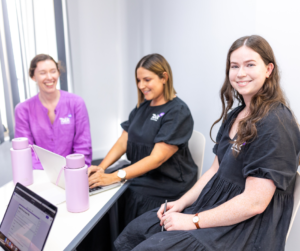Language is more than just speaking; it’s the foundation of communication, learning, and social interaction. For school-aged children, strong language skills support academic success, friendships, confidence, and self-expression. At TalkHQ, we understand the importance of language development in the school years, from prep through upper primary. Let’s explore why language skills matter, key areas to focus on, and practical tips to foster growth at home.
Why Language Skills Matter
Language skills go beyond talking—they’re about understanding complex ideas, expressing thoughts clearly, and navigating reading, writing, and social situations. Strong language skills allow children to process instructions, follow and share stories, and build vocabulary and critical thinking abilities. Children who express themselves clearly and understand instructions are better able to participate in classroom activities, complete assignments, and connect with peers.
Key Areas of Language Development
Language development involves several key areas:
- Receptive language: Understanding spoken and written language.
- Expressive language: Conveying thoughts effectively.
- Social communication: Following the rules of conversation and social interactions.
- Reading and writing: Developing literacy skills and comprehension.
Each of these areas plays a vital role in how children communicate and engage in school and social settings.
Common Language Challenges in School-Aged Kids
Some children face challenges in their language development, which can affect academic performance and social interactions. Common difficulties include trouble following instructions, limited vocabulary, difficulty telling stories or organising thoughts, social communication struggles, and reading or writing issues. These challenges can impact a child’s confidence and lead to frustration, so early support is crucial, and our team at TalkHQ is here to help.
Practical Tips to Support Language Development at Home
Supporting language development can happen in small, everyday moments at home. Here are some strategies:
- Encourage storytelling: Ask your child to share stories from their day or talk about their favorite shows.
- Build vocabulary through real-life situations: During a walk, point out and describe what you see, or talk about cooking steps and ingredients.
- Read together: For younger children, read aloud and discuss the story. For older kids, encourage them to read aloud and ask questions.
- Play language-based games: Games like “20 Questions” or “I Spy” build vocabulary and social language skills in a fun way.
- Model clear language: Use proper sentence structure and vocabulary in your conversations to provide examples for your child to learn from.
- Support your child’s interests: Tailor language activities to their passions—whether it’s animals, space, or hobbies—to make learning exciting and relevant.
When to Seek Professional Support
If your child is still struggling with language skills despite these efforts, it may be helpful to seek additional support. Signs that a language delay or difficulty may be present include difficulty understanding instructions, limited vocabulary for their age, trouble following stories, unusual challenges with reading or writing, and difficulty with social situations. A speech pathologist can assess your child’s specific needs and design a personalised plan to help them thrive. At TalkHQ, we specialise in supporting school-aged children with tailored therapy to turn language challenges into strengths.
How TalkHQ Can Help
At TalkHQ, we’re dedicated to helping families find effective language strategies. Our team of speech pathologists offers a range of services, including language assessments to understand your child’s strengths and areas for growth, individual and group therapy to target specific skills, school holiday programs for fun language practice, and resources for parents to support language development at home. Our play-based approach makes learning enjoyable, unlocking each child’s full communication potential.
Supporting your child’s language development is a journey. Small, consistent efforts at home—like storytelling, reading, and conversations—help build a strong foundation that will benefit them for years. When you need extra support, TalkHQ is here to provide expert guidance and therapy tailored to your child’s needs.
For more information, visit TalkHQ or contact us. Let’s make language learning a rewarding experience for your child!







